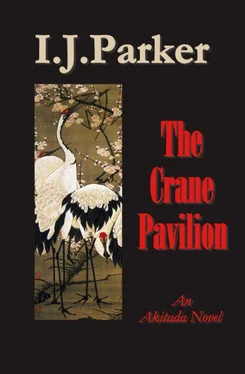I. Parker - The Crane Pavillion
Здесь есть возможность читать онлайн «I. Parker - The Crane Pavillion» весь текст электронной книги совершенно бесплатно (целиком полную версию без сокращений). В некоторых случаях можно слушать аудио, скачать через торрент в формате fb2 и присутствует краткое содержание. Жанр: Исторический детектив, на английском языке. Описание произведения, (предисловие) а так же отзывы посетителей доступны на портале библиотеки ЛибКат.
- Название:The Crane Pavillion
- Автор:
- Жанр:
- Год:неизвестен
- ISBN:нет данных
- Рейтинг книги:5 / 5. Голосов: 1
-
Избранное:Добавить в избранное
- Отзывы:
-
Ваша оценка:
- 100
- 1
- 2
- 3
- 4
- 5
The Crane Pavillion: краткое содержание, описание и аннотация
Предлагаем к чтению аннотацию, описание, краткое содержание или предисловие (зависит от того, что написал сам автор книги «The Crane Pavillion»). Если вы не нашли необходимую информацию о книге — напишите в комментариях, мы постараемся отыскать её.
The Crane Pavillion — читать онлайн бесплатно полную книгу (весь текст) целиком
Ниже представлен текст книги, разбитый по страницам. Система сохранения места последней прочитанной страницы, позволяет с удобством читать онлайн бесплатно книгу «The Crane Pavillion», без необходимости каждый раз заново искать на чём Вы остановились. Поставьте закладку, и сможете в любой момент перейти на страницу, на которой закончили чтение.
Интервал:
Закладка:
“Well, it was natural enough,” Akitada said, patting the boy’s shoulder. But he rose to his feet, puzzled by something. “The lady isn’t there any longer. The pavilion is empty. Would you mind very much going there with me?”
Again they consulted by looking at each other. Then the girl said, “We wouldn’t mind.”
“Thank you.”
Akitada went back to the old woman. “I’m taking the children across to the lady’s pavilion for just a little while. My name is Sugawara. I am from the Ministry of Justice.”
She stared at him. “Are you investigating? Has she been murdered then? They said she hanged herself.”
This was awkward. Akitada said quickly, “The police are satisfied it was suicide. But the lady’s relatives are eager to know what may have caused her to take this tragic step. The children may be helpful.”
The avid interest disappeared. She nodded, slightly deflated. “Yes, of course. I’m sure they’re safe enough with you, my Lord.”
*
He hated taking the children back to the place where the woman had died. The boy seemed eager enough, now that he knew he was not in trouble for having touched Lady Ogata’s dangling feet. His sister, however, had become very quiet.
When they neared the pavilion and looked out over the lake, he saw that the cranes had returned. Turning to Maeko, he asked, “Are those cranes always there?”
She nodded.
“And that is why you called this place the crane pavilion?”
“She called it that. She loved the ducks and cranes, but the cranes especially. She said they reminded her of when she was young.”
“How so?”
“There was a dance she used to do. It was called ‘Cranes Dancing at the Shore.’”
There it was again, the hint that the dead woman had been an entertainer.
As they stood watching the peculiar slow movements of the cranes, Maeko slipped her hand into his and looked up at him. “She taught me a little bit of it. Would you like to see?”
“Oh, I would be delighted.”
“No, let’s go,” Shiro said, pulling his hand free. In a moment he had scrambled up the incline to the pavilion.
“Shiro!” cried his sister. “Come back here.”
“Never mind,” said Akitada. “Let him go. I would very much like to see you dance.”
She blushed a little, but stepped away a few feet. And there on the mossy ground she began a slow and charming dance, moving fluidly, lifting her arms as if she were shaking out her wings, bending toward the ground as if searching for fish in the water. With some slow steps, the girl-bird spread its wings, raised itself upward and then dipped low, only to raise its head again. Maeko stopped suddenly. “That’s all I know how to do. There’s more. It’s better with music. The lady used to hum along.”
“It was beautiful. Thank you. Did the lady talk much about her youth?”
“Not really. Only about how she was chosen to dance for the emperor.”
Akitada’s eyebrows rose. So! Not an entertainer in the willow quarter then. The word “chosen” suggested a special court festivity. Girls or very young women belonging to good families appeared for certain annual events involving performances. They marked their entrance into the world of eligible brides. This was becoming interesting.
“Are you sure she never talked about other things in her life?”
Maeko shook her head. “No. Never. She got sad when we asked her questions.”
“Well, let’s go and see what your brother is doing.”
Shiro was standing on the veranda railing, investigating a bird’s nest under the eaves.
Maeko cried, “Get down, Shiro. You might fall and tear your new shirt. Mother would be very unhappy.”
“I’ll be careful,” replied the boy, trying to climb the veranda column.
Akitada plucked him down. “Come, Shiro,” he said. “I need you to take a look at the room and show me exactly what you did that morning. You don’t have to go inside, just look in from the door.”
The door was unlocked. The children stayed outside while Akitada walked in and opened the shutters; sunlight streamed in. The place looked untouched from his last visit. Maeko looked frightened, but Shiro pointed to the center of the room, his eyes fixed on the beam that had supported the body of Lady Ogata.
“I went just there,” he said. “Her feet were in front of my face.” He gestured to his chin. “But she wasn’t standing on them. She was floating. Like a fairy. I went up to her and gave her a little push, and she started swinging.” He looked at Akitada. “I didn’t mean to,” he said again defensively.
“I know. I can see that you wanted to know how she could float in the air.”
The boy nodded.
“Did you see anything else nearby? Her fan maybe, or the clothes rack? Or one of the trunks?”
The boy shook his head. “No.”
With a profound sense of satisfaction, Akitada turned to Maeko. “And you didn’t see anything either?
She shook her head.
“Was everything the same as now?”
She looked again, then pointed to one of the trunks. “I think that was a little closer to the other trunk.”
He and Tora had inspected the trunks, but he knew they had not moved them. He nodded. “Thank you, my dears. You have been a big help and shall have a present. Let’s go back now before your mother starts to worry.”
He delivered the children into the hands of the old woman, having given each a piece of silver. He could not afford it, but they were poorer than he was, and they had been good children.
And they had given him proof that Lady Ogata had been murdered.
20
After his satisfaction over having been proven correct in his suspicions, Akitada suffered a strong depression. As he walked homeward from the mansion, it struck him that his pleasure at having discovered a crime was shameful. A suicide was tragic, but murder was much worse; it shifted emotions from grief and regret to horror and anger. It also meant the story was just beginning, and it would not have a pleasant end. He should not be proud that he had set out to prove a man guilty simply because he detested him. For that matter, there was no proof that the saintly abbot had had anything to do with this. He still had no idea how or why the killer had ended the lady’s life.
He ruminated over these considerations as he came within sight of his own gate and realized that for the span of the past hour or so he had forgotten Tamako. Grief and pain washed over him, and he stopped in the street, gazing miserably at his house. Would it happen this way? Would he forget her so easily, so completely?
As if she had never been?
Yes. He knew in his heart that he would stop thinking of her eventually. Perhaps not right away, but as the years passed. The pity of this forgetting choked him and he wept.
Weeping in the middle of the street and within sight of his neighbors who might emerge at any moment would not do. They already thought him eccentric and possibly dangerous because of his involvement in crimes. He dashed away the tears with his sleeve and hurried to his gate.
Genba admitted him. “Lady Akiko is here, sir,” he said with a smile. The smile faded when he saw his master’s face.
To forestall a comment, Akitada asked, “Any sign of Tora or Saburo?”
“No, sir. It’s troubling. I hope Tora finds him.”
Akitada nodded and walked quickly to the main house. He did not want to see Akiko just now. What he really wanted to do was to go to the small family shrine where they kept the altar and the ancestral plaques. There he wanted to kneel, not to pray to the Buddha figure on the altar, but to talk to his wife as he used to do when she was alive. He had kept to this habit every day since his return.
Читать дальшеИнтервал:
Закладка:
Похожие книги на «The Crane Pavillion»
Представляем Вашему вниманию похожие книги на «The Crane Pavillion» списком для выбора. Мы отобрали схожую по названию и смыслу литературу в надежде предоставить читателям больше вариантов отыскать новые, интересные, ещё непрочитанные произведения.
Обсуждение, отзывы о книге «The Crane Pavillion» и просто собственные мнения читателей. Оставьте ваши комментарии, напишите, что Вы думаете о произведении, его смысле или главных героях. Укажите что конкретно понравилось, а что нет, и почему Вы так считаете.












